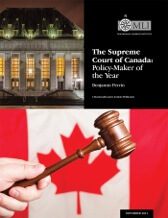Writing in the National Post, Macdonald-Laurier Institute Senior Fellow Benjamin Perrin argues that newly-appointed Suzanne Côté arrives to the Supreme Court at the tail end of a significant year for the court.
Perrin, echoing his newly-released MLI paper, makes the case that the Supreme Court was the “Policy-Maker of the Year” for 2014.
He looked back at 10 cases and concluded that the past year was important both in the court’s impact on public policy and its relationship with the federal government.
What’s still unclear, he says, is whether 2014 was an outlier or the start of a new trend for the court.
By Benjamin Perrin, Nov. 28, 2014
Prime Minister Stephen Harper has appointed Quebec lawyer Suzanne Côté to the Supreme Court of Canada. Justice Côté joins the Court at a moment in history when it is having an increasingly large impact on policy, is remarkably united, and is handing the federal government a string of major losses.
Each year, the Macdonald-Laurier Institute for Public Policy recognizes a “Policy Maker of the Year.” Past recipients have included former Bank of Canada governor Mark Carney and Minister of Foreign Affairs and International Trade John Baird. This year, the choice is not a person but rather an institution, whose impact on public policy in our country has been wide-reaching and long-lasting — the Supreme Court of Canada.
During the last year, numerous commentators have characterized the decisions of the Court as reflecting a string of “losses” for Prime Minister Harper’s government. We examined the top-10 most significant decisions of the Court during this period to identify their legal and policy implications and also to examine whether Canada has indeed entered a “legal cold war” between the federal government and the Court, as some have claimed. The findings are very interesting, while recognizing the Court’s work tends to be cyclical over the long-term.
First, the policy and legal impact of the Supreme Court of Canada’s decisions of the last year are significant and likely enduring. There appears to have been a disproportionate number of landmark cases decided by the Court in the last 12 months with more controversial issues yet to be decided.
The Court has essentially taken Senate reform off the federal agenda for the foreseeable future, effectively torpedoing both the governing Conservatives’ reform program and the Official Opposition New Democrats’ policy of abolishing the Senate. It has struck down much of Canada’s prostitution legislation, resulting in a dramatic rewriting of the law by the current government. It has also changed the landscape in parts of Canada for aboriginal rights and title with implications for major resource development projects, affected tools available for fighting crime and terrorism, and limited how future appointments to the Court from Quebec can occur. It has also narrowly interpreted and struck down some “tough on crime” legislation, with its decision pending on several new mandatory minimum penalties.
Second, during the last year, the Supreme Court of Canada was a remarkably united institution with consensus decisions on significant cases being the norm, and dissenting opinions rare. Of the 10 significant decisions reviewed, only two had dissenting reasons. The Court has only reached such a high level of consensus once in the past decade in terms of yearly averages.
There is no evidence of any deep fissures within the Court along ideological lines. This is in stark contrast to previous decades at the Court and has often been the case at the U.S. Supreme Court. There is likewise no observable split in the Court’s decisions on significant issues between the six judges appointed by Prime Minister Harper and the three judges appointed by previous prime ministers. In short, “Harper’s Court” it is most certainly not.
Third, the federal government has indeed suffered an abysmal record of losses on significant cases in the last year, with a clear win in just one in 10 of them and mixed results in two other cases. By way of providing some context, Patrick Monahan and Chanakya Sethi have found that historically, on average, 41% of Charter claimants have been successful in the Court, meaning that various levels of government succeeded in 59% of such cases.
However, it bears mention that the abysmal record of recent losses for the federal government does not mean that all of these losses are attributable to laws or recent action of the current federal government led by Prime Minister Harper. For example, some cases relate to action originating decades ago, by other levels of government as in Tsilhqot’in Nation v. British Columbia. This case was triggered by a commercial logging licence issued by B.C. in 1983 — nevertheless, the current federal government sided with B.C. and lost.
What should the federal government do going forward? A post-mortem of these cases, as a whole, should be conducted within the federal government to determine the factors that may have contributed to these losses. Was the legal advice received by the government unreasonable or was reasonable advice not followed? Could the federal government have been more pro-active in participating earlier in important litigation, marshalling evidence, conducting outreach to potentially friendly interveners, and retaining eminent external counsel? While there are a range of factors that contribute to a record of the type that the federal government has recently endured, a detailed internal review could expose systematic weaknesses with the federal government’s litigation strategy that could be addressed for future cases if it wants to preserve its agenda.
One would be hard-pressed to find another person or institution in Canada who has had a greater impact on such a wide range of issues than the Court has in the last year, such that the moniker “Policy Maker of the Year” is appropriate. The Court, no doubt, would resist such a label on the view that it simply applies the law as part of its constitutional mandate. But the policy impact of its recent decisions speaks for itself.
Benjamin Perrin is a law professor at the University of British Columbia and a senior fellow at the Macdonald-Laurier Institute for Public Policy. He is former special advisor, legal affairs and policy in the Office of the Prime Minister and served as a law clerk at the Supreme Court of Canada. His full report “The Supreme Court of Canada: Policy Maker of the Year” is available online from MLI.






